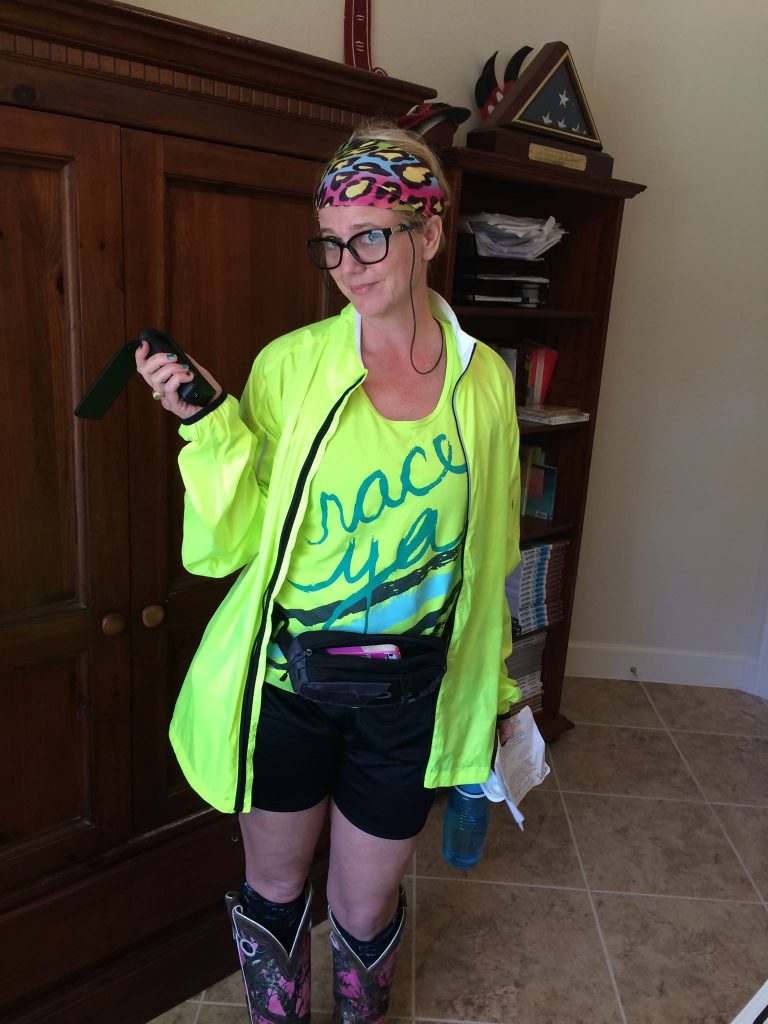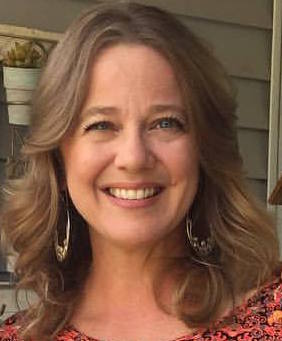
Update: I have now talked-to-text three novels and one novella while walking, standing, and sitting in an infrared sauna. Multi-tasking rocks! I find the voice recognition feature spotty and the commands don’t always work as intended, but I know I can customize the commands when I have the time, and the time saver is enormously helpful.
I just finished rewrites on my 8th novel, Fighting for Anna, a romantic mystery. It’s the first one I’ve drafted entirely by voice recording, however, and I want to get my thoughts down for you guys fast while they’re fresh. It was an incredible learning experience, and I’ve already drafted (more successfully) a novella, and I’m starting another novel. That’s me, above, heading out to write a book 🙂
First, why I’m voice recording:
- To get off my butt
- To multi-task
- To help my back (sitting is horrible for it)
- To help my hands (they swell)
How I’m doing it: I tried a variety of voice apps, starting with the Apple voice recognition right on my Mac. But I was looking for the ability to record while I walked and drove, so the Mac was out. I tried apps like Dragon Dictate, but they gave me gibberish. And I became obsessed with trying to correct the gibberish. Also, I walk in the wilderness, where there often is no signal and thus no ability to record into one of the lovely little apps.
So, based on advice from a writer I respected, I chunked down a wad of cash and bought an Olympus DS-7000 Digital Voice Recorder. It’s handheld, great battery, lots of memory, and easy to use. I love it. But that meant I needed transcription, so I turned to romantic mystery author/publishing assistant extraordinaire Bobbye <3 who put up with my heavy breathing and the noises of animals, phones, and cars. Not to mention my ineptitude at recording!!!!
I do separate files for each scene. I also make lots of verbal notes, because I usually think of everything I should have said only after I finish a scene. Or when I start the next one. Bobbye keeps a master document, individual scenes, a list of my verbal notes (also leaving them “in place”), and a glossary of names of people, places, and important things. She also includes her own notes of suggestions, and she occasionally answers my verbal questions via email. She is DA BOMB.
Learning points:
- The most important thing I did was outline before I started recording. Not only that but I fleshed out the outline before I did each scene, and sometimes I carried bullet point notes so that I could stay on track.
- Don’t skip days. The worst thing I did was skip days or even weeks recording. Because we had Bobbye busy on other things, she didn’t transcribe in sync with me. Thus I had no written document to turn to to refresh my memory on where I was when I resumed. And I can’t abide my own voice nor did I want to waste time listening to 45 minute recordings. So next time, I CANNOT skip days, and transcription and recording need to be synced. It’s clear I retain best by handwriting things, second best by typing them, and least by saying them.
- JUST KEEP TALKING is my mantra now. Rather than going back and trying to re-record over something or edit something out, I just keep going. It doesn’t matter if Bobbye understands where I’m going with it. She types my words. It only matters that I can edit what I’ve said (and she’s typed) later. So by the end of Going by the Book I was recording a scene, then I’d record it again the way I wanted it. Which left two for Bobbye to transcribe. But that was okay. When I got to that point in my rewrites, I deleted the one I didn’t want. In the novella I just recorded, I decided to change POV halfway through. So be it. I didn’t re-record. I just kept going.
- Expect differences. I have diarrhea of the mouth. Recording this book resulted in a 115,000-word first draft. My normal first drafts are 70,000. OMG. But I found on rewrite that I didn’t cut much. We’ll see how readers like it. But I cranked out a book that was 30% longer in the same amount of time. I even considered breaking it into two books on the rewrite, but it didn’t feel right so I kept it longer and as one.
- Budget more time for your rewrite. Especially for the first few you do. Man oh man, it was a hot mess. I worried about Bobbye not understanding me. That wasn’t the problem. She understood me a lot better than Dragon Dictate or Mac’s voice app did. The problem was that whole skipping days and forgetting things stuff. Sometimes I took off in totally new directions. Lots of times I changed names of characters, even within scenes. It was the NORM that I didn’t remember earlier plot points and character development. Ay carumba. But I got it all straightened out eventually.
- I found myself talking directly to Bobbye. I also acted out my characters. She never mentioned this to me, but I picture her and her husband having a laugh as I bungled Lumpy, Michele’s next door neighbor. I tried NOT to. But I think that was a mistake. On my next draft, I am going to indulge it and let it rip. I think I write better that way. I guess in my head I’ve been doing it all along. So let your inner characters roar (unless Dragon Dictate or the like can’t understand your accent and colloquialisms, in which case, talk like a proper British school teacher).
By the way, Bobbye said that she often changed the speed of my recording as she typed. When she slowed me down, I sounded drunk. When she speeded me up, I sounded high. I think that’s pretty apt for how I felt at times doing this. At first it was super hard. It took about 100,000 words for me to really feel like I knew how to write my book this way. By then I loved it, but still knew I had that bitch of a rewrite to undertake. Luckily, I’m on the right side of that one and itching to start recording my next novel.
How has recording gone for you guys? Let us know your tips and learnings in the comments.
Pamela
Pamela Fagan Hutchins, winner of the 2017 Silver Falchion award for Best Mystery (Fighting for  Anna), writes overly long e-mails, hilarious nonfiction (What Kind of Loser Indie Publishes, and How Can I Be One, Too?), and series mysteries, like those in her What Doesn’t Kill You world, which includes the bestselling Saving Grace and the 2015 and 2016 WINNERS of the USA Best Book Award for Cross Genre Fiction, Heaven to Betsy and Hell to Pay. You can snag her newest release, Bombshell, if you’ve already run the rest of the table. She teaches writing, publishing, and promotion at the SkipJack Publishing Online School (where you can take How to Sell a Ton of Books, FREE) and writes about it here on the SkipJack Publishing blog.
Anna), writes overly long e-mails, hilarious nonfiction (What Kind of Loser Indie Publishes, and How Can I Be One, Too?), and series mysteries, like those in her What Doesn’t Kill You world, which includes the bestselling Saving Grace and the 2015 and 2016 WINNERS of the USA Best Book Award for Cross Genre Fiction, Heaven to Betsy and Hell to Pay. You can snag her newest release, Bombshell, if you’ve already run the rest of the table. She teaches writing, publishing, and promotion at the SkipJack Publishing Online School (where you can take How to Sell a Ton of Books, FREE) and writes about it here on the SkipJack Publishing blog.
Pamela resides deep in the heart of Nowheresville, Texas and in the frozen north of Snowheresville, Wyoming. She has a passion for great writing and smart authorpreneurship as well as long hikes and trail rides with her hunky husband, giant horses, and pack of rescue dogs, donkeys, and goats. She also leaps medium-tall buildings in a single bound (if she gets a good running start).
Pingback: Pamela Fagan Hutchins | Winging It: The Story Behind the Story of Act One
Thank you for your great post. I just invested in Dragon and am about to try it with Scrivener (also new). I am excited to get started! I fantasize dictating into a recorder while driving or walking my dog. For now, just getting used to having to speak my punctuation!
You are very welcome. Good luck to you!